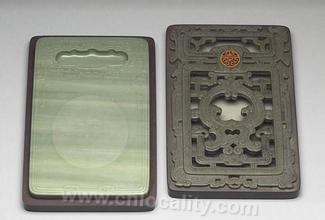welcomeSpecialty Foods Products!

The Songhua stone used for processing Songhua inkstone was first excavated on the riverside of Dishi Mountain in Changbai Mountain, Tonghua, Jilin Province, and was the imperial item of the Qing emperor. This is also the middle part of the Songhua River, where there are many trees and dense forests. In June, the yellow-green pine flowers in Changbai Mountain pine forest opened, bringing vitality to Changbai Mountain in early spring. The color of this stone is the same as that of pine flowers, so people call it pine stone, and the inkstone made of pine flowers is called Songhua Imperial inkstone. It first appeared in the middle of Ming Dynasty, but it was favored by the Qing Dynasty because of its special historical origin, but it failed to develop into a folk because of the special favor of the Qing emperor. Changbai Mountain, the birthplace of Manchu Dynasty, was sealed as a forbidden area by the royal family, and fishing and hunting were prohibited. Pine stone can only be collected in the mountains by the' construction office' of the palace, and then transported back to the palace to be developed into inkstone, which will be used as a national treasure, and a small amount will also be given to meritorious officials. During the reign of Kang Gan, more than 80 square inkstones were made, and later generations successively developed more than 80 square inkstones. At present, there are 80 square inkstones in the imperial palace, all of which are stored in the two houses of the Forbidden City, and most of them are in Taipei. The use of pine stone inkstone began in the late Ming Dynasty, which was more important than that in the Qing Dynasty. Emperor Kangxi, Yongzheng, Qianlong and other emperors all appreciated pine stone inkstone, and Emperor Kangxi also named it "Imperial inkstone", which has been used exclusively by the court. From 14th to 19th century, Jilin Province was the most important political, economic and military center in Northeast China. In the Qing Dynasty, the Republic of China and the early days of liberation, Jilin City was the capital city of Jilin Province. There was an ancient shipyard on its riverside, which was an important transportation hub in the three northeastern provinces. Waterways extending in all directions, boating in spring, sledding in summer and autumn, and uninterrupted transportation of materials and resources in the northeast all year round, were extremely busy. Manchu originated in Changbai mountain area, and Jilin city was an important place for his activities and a military town, and stationed a large number of troops in his early years. After the Qing dynasty, several generations of ancestors worshipped their ancestors and all wanted to stay here. When Emperor Kangxi came to Changbai Mountain to pay homage to his ancestors, he wrote Song of Boating in Songhua River: Songhua River, the river is clear. The rain comes at night, and the flowers bloom and rust. Colorful sails paint snipes lightly with the wind, the flute and Shao play in the middle of the stream, and the pale rocks and green walls cross the banks. Clouds shine in He Jingjing? Taking the current straight down the dragon, I was shocked, and even took the ship to Tunjiang City. The brave and healthy armor are all elite, and the water is shining over Zhu Ying. Let me ask the vulgar and not the soldiers. Songhua River, the river is clear.
Reprinted with attribution:
https://cnlocality.com/(Chinese Specialty Products)
other
consult:(+86)13225231905